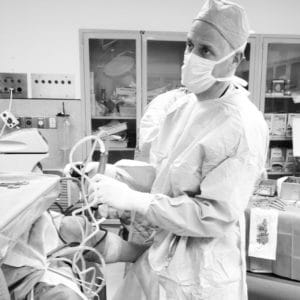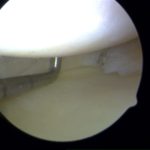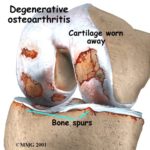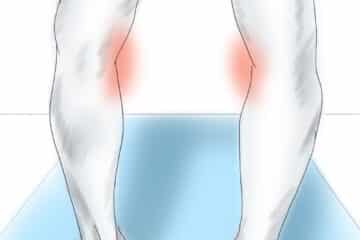
 A recent article in the New England Journal of Medicine has attracted a lot of attention… and it should. The article focused on a group of patients with meniscus tears and osteoarthritis. The goal of the study was to determine whether or not surgery was necessary when compared to a group of patients who only had physical therapy. Although it was not the best study possible, the results are encouraging…. depending on your perspective :-) Physical therapy is equally effective at treating patients with both meniscus tears and osteoarthritis as surgery is. Imagine that!
A recent article in the New England Journal of Medicine has attracted a lot of attention… and it should. The article focused on a group of patients with meniscus tears and osteoarthritis. The goal of the study was to determine whether or not surgery was necessary when compared to a group of patients who only had physical therapy. Although it was not the best study possible, the results are encouraging…. depending on your perspective :-) Physical therapy is equally effective at treating patients with both meniscus tears and osteoarthritis as surgery is. Imagine that!
The issues, however, run deeper than those studied by the authors. Those issues include:
- Why were the MRIs performed in the first place?
- Why is it easier to get permission for an MRI and surgery than it is to get permission for physical therapy?
- Kudos to Dr Jen Gunter for her thoughts on this!
- Why do many patients expect an MRI for every joint ache or pain?
- Why do providers agree to order that MRI?
- Are we treating MRI findings— or are we treating patients?


What most people in their 40s and up do not realize is that many of you have meniscus tears, and perhaps even a rotator cuff tear and yet you have no pain. Which meniscus tears hurt and why is an area we’re still studying. There are many different types of meniscus tears. Most tears are degenerative because our parts wear out… and surgery for degenerative tears without loose flaps is very rarely necessary.
If you sustain an injury and your knee hurts… you stand a really good chance of feeling better if you allow the body to heal itself. On occasion we need some assistance and that might mean a visit to your primary care doctor. Hopefully your provider can offer you some tips to set you on the path to recovery… but very rarely should an MRI be ordered (or asked for) soon after the initial injury. MRI’s should be used to confirm diagnoses… not to make a diagnosis. They are most useful if you have failed non-surgical treatment and we are considering surgery. Even in the realm of professional athlete injury management the issue of over-utilization of MRIs has gained a lot of attention .
Given the insight gleaned from this paper, your primary care doctor should likely start you in physical therapy if they suspect that you have suffered a meniscus tear, and your X-rays show evidence of arthritis. But our primary care docs are getting squeezed… they need to see too many people each and every day just to be able to keep their doors open. That leads to rushed visits, easy scripts for MRIs and premature referrals to specialists. That opens the door for a specialist to then recommend an operation based on the MRI findings… and not necessarily because they are treating you as a patient. Many variables need to be considered whenever surgery is being thought of as the primary treatment modality. Your MRI finding is but one small consideration in that “shared decision making process“.
The big picture… many patients will have meniscus tears that will marginally affect their quality of life, if at all. Not all weekend injuries require an MRI … time heals most injuries alone. Surgery is not necessary for all meniscus tears. Doctors need to commit to be willing to spend as much time talking about the non-surgical treatments for meniscus tears as they do trying to explain what the surgery entails. While surgery might ultimately prove to be the proper course of treatment to pursue for certain meniscus tear… it should only follow a course of failed non-surgical treatments for your meniscus tear and osteoarthritis.
Questions? Why don’t you come in and discuss your options. :-)















I enjoyed your article also. I have severe OA in both my knees. I have seen two orthopedic doctors. The one does stem cell therapy using the patients own stem cells. He has told me I mainly have one compartment affected by OA but since the other two compartments have some cartilage among other things I qualify for stem cell therapy. The other Doctor recommends total joint replacements as he says I have bone on bone disease with medial bone spurs on both knees. I tore my meniscus in the last week so he gave me a cortisone shot. I saw my xrays and I do have some space between my femur and tibia in the two compartments but not the medial aspects due to the bone spurs. I would love to have the stem cell therapy but my concern is it won’t work. Would I have to have a repeat of the therapy? It costs $5,000 per knee which would be out of pocket for me. So what do you think?
The future of stem cells is very bright in orthopedic conditions. Unfortunately the science just doesn’t support their use right now. The stem cells/PRP injections for most patients becomes an expensive bridge to an eventual knee replacement. The placebo effect of nearly any treatment means that up to 50% of patients will respond favorably to the injection of anything (saline)- as long as they think it is going to work. It is a difficult decision to make. Ask your stem cell doctor to show you evidence of their methods and how well it has worked.
Thank you so much for your honest reply. I asked my stem cell doctor for proof that the injections work and he referred me to Regenexx study of their approximately 2000 patients which showed 45-75% mprovements in 1-3 years in mobility and pain. I wish it had been an independant study.
Regnenexx doesn’t perform randomized control trials. The placebo effect is strong. So 50% or more can believe they are better when injected with only saline.
Thanks again. Nice to get a confirmation of what I was thinking!
I had surgery for meniscus tear (no arthritis). So glad I did.
So glad to hear you are doing well. Knee pain due to meniscal tears without arthritis often will improve significantly after an arthroscopy.
If I bend my knees too far, they lock with excruciating pain until someone straightens it . POP… then the pain eases to an ache. That is the always problem, now I can’t straighten my left knee because it’s like it is going too far and I’m in constant pain if it’s semi bent for too long or standing too long. There seems to be no happy medium. I have as of late tied a bandana tightly around my knee under the cap and it seems to have ‘secured’ it somehow. I’m not dragging my leg behind me for a change. I hope that can help someone in a similar case, but would more so like to know what the cause is, and what can be done!